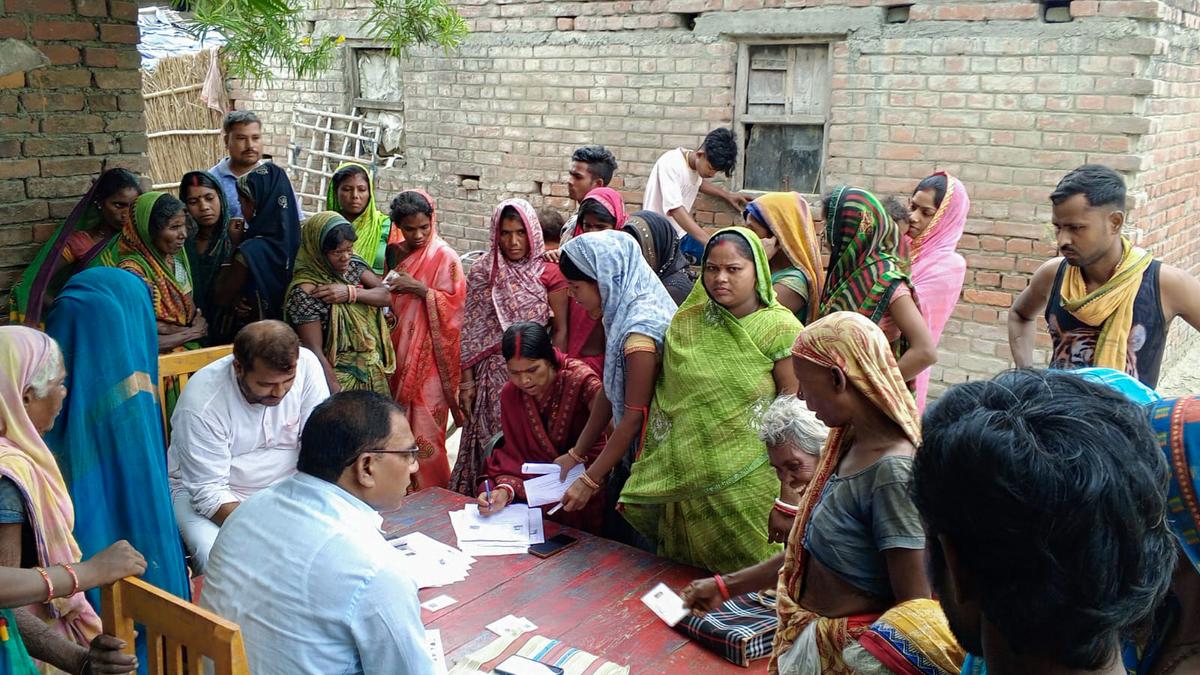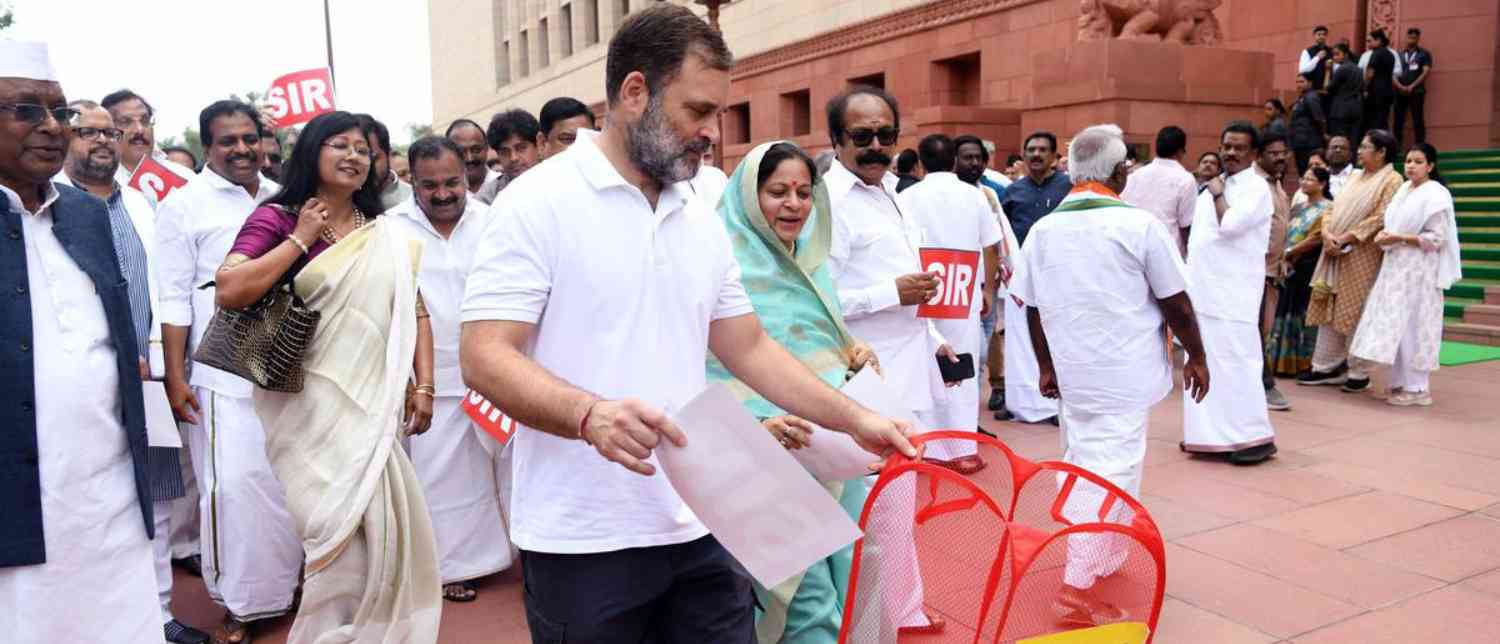The political and legal battle over Bihar’s ongoing Special Intensive Revision (SIR) of electoral rolls has intensified, with the Supreme Court of India reaffirming the Election Commission of India’s (ECI) position that an Aadhaar card cannot be treated as conclusive proof of Indian citizenship. This ruling comes amid serious allegations of large-scale voter deletions, procedural irregularities, and claims of institutionalised disenfranchisement.
The controversy has taken centre stage in national politics, drawing in top leaders from the Opposition, the ruling Bharatiya Janata Party (BJP), and senior legal minds in the country. The matter has triggered protests, sharp exchanges between political parties, and close judicial scrutiny.

Supreme Court’s Landmark Observation: Aadhaar Not Proof of Citizenship
During a special hearing, Justice Surya Kant underscored that while Aadhaar serves as a critical identification tool for accessing government services, it does not in itself confirm an individual’s nationality.
"The EC is correct in saying Aadhaar cannot be accepted as conclusive proof of citizenship. It has to be verified," Justice Kant remarked, addressing senior advocate Kapil Sibal, who represented the petitioners.
The top court clarified that the primary legal question was whether the ECI possesses the authority to conduct such a large-scale voter verification drive. Justice Kant noted that if this authority exists, there should be no fundamental objection to the process itself. If not, the exercise would have to be halted.
This clarification comes as the SIR exercise in Bihar — aimed at cleaning and updating the voter rolls — faces criticism for allegedly leading to wrongful deletions and voter suppression.
What Is the Bihar Special Intensive Revision (SIR)?
The Special Intensive Revision is a comprehensive, state-wide voter list update undertaken by the ECI ahead of the upcoming Bihar Assembly elections.
Its objectives are threefold:
-
Add eligible new voters.
-
Verify the details of existing voters.
-
Remove names of individuals who have died, migrated, or are otherwise ineligible.
The process involves Booth Level Officers (BLOs) visiting households, collecting voter forms, and checking documents to ensure the accuracy of the rolls. The ECI says the ultimate goal is to ensure a clean, error-free electoral roll that upholds the fairness and transparency of elections.
Sibal: Just see what's happening
J Kant: very sweeping argument that in Bihar, nobody possesses these documents. Aadhaar and ration card they have?
Sibal: Yes, but they are not accepting it! They say I will not accept Aadhaar as proof of anything
J Kant: These documents would…— Live Law (@LiveLawIndia) August 12, 2025
Kapil Sibal’s Strong Criticism of the SIR Process
Representing the petitioners, Kapil Sibal argued that every individual born in India after 1950 is constitutionally a citizen. However, he alleged serious procedural lapses in the ongoing exercise.
Sibal cited instances where in one small assembly constituency, 12 living people were marked as deceased. He alleged that BLOs had failed to carry out their duties diligently, leading to errors that could strip citizens of their voting rights.
He further warned that the procedure could result in large-scale voter exclusion, especially for vulnerable groups unable to submit the required forms on time. According to him:
-
Even voters listed in the 2003 rolls were being asked to reapply.
-
Failure to submit forms could lead to deletion from the rolls despite no change of residence.
-
The ECI’s own records showed 7.24 crore form submissions, yet 65 lakh names were deleted without verified evidence of death or migration.
-
The commission admitted, in its affidavit, that no survey was carried out to justify these deletions.
Claims of Mass Voter Deletions and Data Withholding
Senior advocate Gopal S. supported Sibal’s position, describing the removal of 6.5 million names as “mass exclusion.”
Advocate Prashant Bhushan went a step further, alleging that the ECI had refused to provide a breakdown of the deleted names, including how many were deceased and how many had migrated. He claimed that whistleblower documents from two districts revealed 10–12% of form submitters were marked “not recommended” without clear justification.
"In the history of this country, the Election Commission has never done such a thing," Bhushan stated, accusing the ECI of withholding critical information.
#WATCH | Delhi: INDIA bloc leaders continue to protest over the alleged voter fraud and SIR issues. MPs were seen wearing T-shirts featuring the name Minta Devi, a voter allegedly listed as 124 years old in the Election Commission's voter list. pic.twitter.com/LVhS3I5CZJ— ANI (@ANI) August 12, 2025
ECI’s Defense: Errors Are Minor and Correctable
The ECI, represented by senior advocate Rakesh Dwivedi, rejected allegations of deliberate voter suppression. He stressed that:
-
The current list is only a draft roll, allowing for corrections.
-
Minor errors are inevitable in an exercise of such scale.
-
Any wrongful deletions would be addressed before the final roll release.
Dwivedi also denied claims of withholding data, asserting that details had been made available to Booth Level Agents (BLAs).
Political Firestorm: Rahul Gandhi vs BJP Over ‘Vote Theft’
The legal debate has been accompanied by a fierce political showdown. Congress leader Rahul Gandhi, also the Leader of Opposition in the Lok Sabha, has repeatedly accused the ECI and BJP of “institutionalised vote theft”.
Gandhi’s allegations include:
-
Duplicate voters.
-
Voters with fake or invalid addresses.
-
Bulk registrations under single addresses.
-
Invalid photographs.
-
Abuse of Form 6 for new voter registrations.
He claims that these irregularities are being carried out systematically, nationwide, and disproportionately impact minorities and vulnerable groups.
Highlighting one case, Gandhi pointed to 124-year-old Minta Devi still appearing on Bihar’s rolls — a figure that became a symbol of protest, even printed on T-shirts worn by Opposition MPs.
"We are protecting the Constitution. The EC is not enforcing ‘One Man, One Vote,’ which is the foundation of our democracy. Picture abhi baaki hai," Gandhi said.
Why is Rahul Gandhi dodging making a representation to the Election Commission on oath?
Because he knows—
📜 False declaration → Punishable under Sec 31, RP Act 1950
📜 False evidence → Punishable under Sec 227, BNS 2023
Both mean imprisonment!
Reprimanded by the Supreme… pic.twitter.com/lEg3gEcCBH— Amit Malviya (@amitmalviya) August 12, 2025
BJP’s Counterattack: ‘Put It On Oath’
The BJP, led in this matter by IT cell chief Amit Malviya, has accused Gandhi of avoiding the formal process of filing his allegations under oath with the ECI.
Malviya pointed out that under the Representation of the People Act, 1950 and Bharatiya Nyaya Sanhita (BNS) 2023:
-
A false declaration could lead to imprisonment under Section 31.
-
False evidence could be punishable under Section 227.
"Rahul Gandhi is dodging making a representation on oath because he knows the legal consequences. He has been reprimanded by the Supreme Court before for false statements. He doesn’t believe in his own so-called investigation," Malviya posted on X.
Protests, Detentions, and T-Shirt Slogans
On a dramatic Monday, leaders from the INDIA bloc, including Gandhi and Mallikarjun Kharge, marched from Parliament House to the ECI headquarters in New Delhi. The protest was blocked by Delhi Police barricades near Transport Bhawan, and several MPs were detained.
The following day, many Opposition MPs wore white T-shirts with ‘124 Not Out’ printed on them, a nod to the Minta Devi controversy. Some, like Supriya Sule and Kanimozhi, even carried onions as part of the symbolic protest.
VIDEO | "We are protecting the Constitution. EC not doing its duty of enforcing 'One Man, One Vote'... There are countless cases like Minta Devi," says Congress MP Rahul Gandhi on SIR and '124-year-old voter Minta Devi on the Bihar's voters' list'
(Full video available on PTI… pic.twitter.com/m4WEHkTyON— Press Trust of India (@PTI_News) August 12, 2025
Supreme Court’s Direction to ECI: ‘Be Ready With Facts’
During the hearings, the Supreme Court instructed the ECI to present clear figures and data, including:
-
Number of voters before the SIR began.
-
Number of deceased voters before and after.
-
Detailed explanation of any changes.
The court has also made it clear that if evidence of “mass exclusion” emerges, it will intervene immediately.
The draft roll for Bihar was published on August 1, with the final roll due on September 30. The stakes are high, as opposition leaders fear that millions could lose their right to vote ahead of the crucial Assembly polls.
Wider Implications for Electoral Integrity
This case is not just about Bihar. The SIR controversy has opened a broader conversation about:
-
The scope of ECI’s authority in voter verification.
-
The balance between preventing fraud and avoiding disenfranchisement.
-
The role of Aadhaar in electoral processes.
While the ECI argues that its measures are essential for maintaining clean electoral rolls, critics warn of systematic voter suppression if due process and transparency are not upheld.
A Battle Between Verification and Voting Rights
The Bihar SIR row has brought the intersection of law, politics, and democratic rights into sharp focus. On one side, the Supreme Court supports the ECI’s position that Aadhaar alone cannot prove citizenship and that verification is vital. On the other, opposition leaders allege that the same verification process is being weaponised to remove legitimate voters.
With the final voter list due in September and elections looming, the outcome of this battle will likely influence not only Bihar’s political future but also national debates on electoral reforms and voter rights.
For now, one thing is certain: the fight over who gets to vote — and how that decision is made — is far from over. Or, as Rahul Gandhi puts it, “Picture abhi baaki hai.”
With inputs from agencies
Image Source: Multiple agencies
© Copyright 2025. All Rights Reserved. Powered by Vygr Media.






















